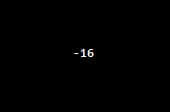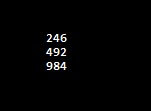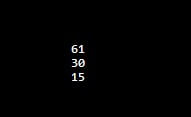Bit Manipulation in Java
Usually, a programmer works on variables of data types like int, float, double, String or collections like Array, List, ArrayList and so on. In some cases, programmers need to go much deeper into the data at the byte and the bit level to extract and manipulate the data. Languages like Java and C# let you manipulate data at the bit level, which means you have access to a specific bit in a byte. In this topic, we are going to learn about Bit Manipulation in Java.
Bit Manipulation in Java is often required when working on Data Compression and Data Encryption, where the programmer needs to extract data at the bit level to encode, decode or compress the original data. There are many other applications of Bit manipulation that we gonna see later in this article.
Start Your Free Software Development Course
Web development, programming languages, Software testing & others
Java supports 3-bit shift and 4 bitwise operators to perform operations at the bit level. These operators can be used on integral types (int, short, long and byte) to perform operations at the bit level.
Java Bitwise and Bitshift Operators
Following are the operators:
| Operator | Description |
| & | Bitwise AND |
| | | Bitwise OR |
| ~ | Bitwise Complement |
| << | Left Shift |
| >> | Right Shift |
| ^ | Bitwise XOR |
| >>> | Unsigned Right Shift |
Operators of Bit Manipulation in Java
Let’s have a look at the operators in more detail.
1. Bitwise OR
This is a binary operator which takes 2 operands and denoted by the symbol “| “. The bitwise operator compares the corresponding bits of the two operands. If any of the operand bit is 1, then the output is 1; if not, it will be 0.
Example
15 = 00001111 (In Binary)
27 = 00011011 (In Binary)
Bitwise OR Operation of 15 and 27
00001111
| 00011011
________
00011111 = 31 (In decimal)
Java Program
public class BitwiseOR {
public static void main(String[] args) {
int operand1 = 15, operand2 = 27, output = operand1 | operand2;
System.out.println(output);
}
}Output:

2.Bitwise AND
This is also a bitwise operator, which takes 2 operands and denoted by the symbol “&”. the bitwise operator compares the corresponding bits of the two operands. If both the operand bits are 1, then the output is 1; otherwise, 0.
Example
15 = 00001111 (In Binary)
27 = 00011011 (In Binary)
Bitwise AND Operation of 15 and 27
00001111
| 00011011
________
00001011 = 11 (In decimal)
Java Program
public class BitwiseAND {
public static void main(String[] args) {
int operand1 = 15, operand2 = 27, output = operand1 & operand2;
System.out.println(output);
}
}Output:

3. Bitwise Complement
Unlike the other two operators we have discussed so far, this takes only one operand and denotes the symbol “~”. This operator inverts the bit of the operand. If the operand bit is 0, then it converts it into 1 and vice-versa.
Example
15 = 00001111 (In Binary)
Bitwise complement Operation of 15
~ 00001111
________
11110000 = 240 (In decimal)
Java Program
public class BitwiseComplement {
public static void main(String[] args) {
int operand= 15, output;
output= ~operand;
System.out.println(output);
}
}Output:

2’s complement of any number is equivalent to -(n+1), where n is the number whose 2’s complement is to be calculated. In our case, the 2’s complement of operand 15 is -16, which is the program’s output.
4. Bitwise XOR
Bitwise XOR is a binary operator which takes 2 operands and denotes with a symbol “^”. this operator compares the corresponding bits of the two operands if the corresponding bits of the two operands are different that it gives 1 as an output else 0.
Bitwise XOR operator is equivalent to (Bitwise OR + Bitwise Complement)
Example
15 = 00001111 (In Binary)
27 = 00011011 (In Binary)
Bitwise XOR Operation of 15 and 27
00001111
^ 00011011
________
00010100 = 20 (In decimal)
Java Program
public class BitwiseXor {
public static void main(String[] args) {
int operand1= 15, operand2 = 27, output;
output = operand1 ^ operand2;
System.out.println(output);
}
}Output:

5. Signed Left Shift
The left shift bitwise operator shift the bit pattern to the left by a certain number of times specified in the operand. The left shift operator is denoted by the symbol “<<”.
Example
123 (In binary: 01111011)
123 << 1 evaluates to 246 (In binary: 011110110)
123 << 2 evaluates to 492 (In binary: 0111101100)
123 << 3 evaluates to 984 (In binary:01111011000)
Java Program
public class LeftShiftOperator {
public static void main(String[] args) {
int operand = 123;
System.out.println(operand << 1);
System.out.println(operand << 2);
System.out.println(operand << 3);
}
}output:

6. Signed Right Shift
The signed right shift operator works exactly the same as the left shift operator, just that it adds zero bits are shifted to the high order position.
Example
123 (In binary: 01111011)
123 >> 1 evaluates to 61 (In binary: 00111101)
123 >> 2 evaluates to 30 (In binary: 00011110)
123 >> 3 evaluates to 15 (In binary:00001111)
Java Program
public class RightShiftOperator {
public static void main(String[] args) {
int operand = 123;
System.out.println(operand >> 1);
System.out.println(operand >> 2);
System.out.println(operand >> 3);
}
}Output:

7. Unsigned Right Shift
The right shift operator shifts zero to the leftmost position by the certain number of bits specified in the operand.
Java Program
public class UnSignedRightShiftOperator {
public static void main(String[] args) {
int operand = 123;
System.out.println(operand >>> 1);
System.out.println(operand >>> 2);
System.out.println(operand >>> 3);
}
}Output:

Conclusion – Bit Manipulation in Java
Now that we have reached the end of the article, let’s wrap up by summarizing the key point that we have discussed in this article. We have seen what a bit manipulation is and its different use cases. We have also learned the different types of bitwise operators (Bitwise AND, Bitwise OR, Bitwise Complement and Bitwise XOR) and bit shift operators (Signed Left Shift operator, signed Right Shift Operator and unsigned Right shift operators) along with an example and a sample Java program explaining individual operators.
The above is the detailed content of Bit Manipulation in Java. For more information, please follow other related articles on the PHP Chinese website!

Hot AI Tools

Undresser.AI Undress
AI-powered app for creating realistic nude photos

AI Clothes Remover
Online AI tool for removing clothes from photos.

Undress AI Tool
Undress images for free

Clothoff.io
AI clothes remover

Video Face Swap
Swap faces in any video effortlessly with our completely free AI face swap tool!

Hot Article

Hot Tools

Notepad++7.3.1
Easy-to-use and free code editor

SublimeText3 Chinese version
Chinese version, very easy to use

Zend Studio 13.0.1
Powerful PHP integrated development environment

Dreamweaver CS6
Visual web development tools

SublimeText3 Mac version
God-level code editing software (SublimeText3)

Hot Topics
 Java Spring Interview Questions
Aug 30, 2024 pm 04:29 PM
Java Spring Interview Questions
Aug 30, 2024 pm 04:29 PM
In this article, we have kept the most asked Java Spring Interview Questions with their detailed answers. So that you can crack the interview.
 Break or return from Java 8 stream forEach?
Feb 07, 2025 pm 12:09 PM
Break or return from Java 8 stream forEach?
Feb 07, 2025 pm 12:09 PM
Java 8 introduces the Stream API, providing a powerful and expressive way to process data collections. However, a common question when using Stream is: How to break or return from a forEach operation? Traditional loops allow for early interruption or return, but Stream's forEach method does not directly support this method. This article will explain the reasons and explore alternative methods for implementing premature termination in Stream processing systems. Further reading: Java Stream API improvements Understand Stream forEach The forEach method is a terminal operation that performs one operation on each element in the Stream. Its design intention is
 PHP: A Key Language for Web Development
Apr 13, 2025 am 12:08 AM
PHP: A Key Language for Web Development
Apr 13, 2025 am 12:08 AM
PHP is a scripting language widely used on the server side, especially suitable for web development. 1.PHP can embed HTML, process HTTP requests and responses, and supports a variety of databases. 2.PHP is used to generate dynamic web content, process form data, access databases, etc., with strong community support and open source resources. 3. PHP is an interpreted language, and the execution process includes lexical analysis, grammatical analysis, compilation and execution. 4.PHP can be combined with MySQL for advanced applications such as user registration systems. 5. When debugging PHP, you can use functions such as error_reporting() and var_dump(). 6. Optimize PHP code to use caching mechanisms, optimize database queries and use built-in functions. 7
 TimeStamp to Date in Java
Aug 30, 2024 pm 04:28 PM
TimeStamp to Date in Java
Aug 30, 2024 pm 04:28 PM
Guide to TimeStamp to Date in Java. Here we also discuss the introduction and how to convert timestamp to date in java along with examples.
 Java Program to Find the Volume of Capsule
Feb 07, 2025 am 11:37 AM
Java Program to Find the Volume of Capsule
Feb 07, 2025 am 11:37 AM
Capsules are three-dimensional geometric figures, composed of a cylinder and a hemisphere at both ends. The volume of the capsule can be calculated by adding the volume of the cylinder and the volume of the hemisphere at both ends. This tutorial will discuss how to calculate the volume of a given capsule in Java using different methods. Capsule volume formula The formula for capsule volume is as follows: Capsule volume = Cylindrical volume Volume Two hemisphere volume in, r: The radius of the hemisphere. h: The height of the cylinder (excluding the hemisphere). Example 1 enter Radius = 5 units Height = 10 units Output Volume = 1570.8 cubic units explain Calculate volume using formula: Volume = π × r2 × h (4
 PHP vs. Python: Understanding the Differences
Apr 11, 2025 am 12:15 AM
PHP vs. Python: Understanding the Differences
Apr 11, 2025 am 12:15 AM
PHP and Python each have their own advantages, and the choice should be based on project requirements. 1.PHP is suitable for web development, with simple syntax and high execution efficiency. 2. Python is suitable for data science and machine learning, with concise syntax and rich libraries.
 Create the Future: Java Programming for Absolute Beginners
Oct 13, 2024 pm 01:32 PM
Create the Future: Java Programming for Absolute Beginners
Oct 13, 2024 pm 01:32 PM
Java is a popular programming language that can be learned by both beginners and experienced developers. This tutorial starts with basic concepts and progresses through advanced topics. After installing the Java Development Kit, you can practice programming by creating a simple "Hello, World!" program. After you understand the code, use the command prompt to compile and run the program, and "Hello, World!" will be output on the console. Learning Java starts your programming journey, and as your mastery deepens, you can create more complex applications.
 How to Run Your First Spring Boot Application in Spring Tool Suite?
Feb 07, 2025 pm 12:11 PM
How to Run Your First Spring Boot Application in Spring Tool Suite?
Feb 07, 2025 pm 12:11 PM
Spring Boot simplifies the creation of robust, scalable, and production-ready Java applications, revolutionizing Java development. Its "convention over configuration" approach, inherent to the Spring ecosystem, minimizes manual setup, allo






